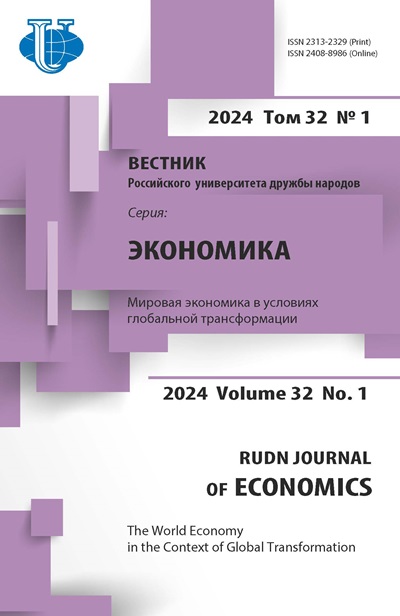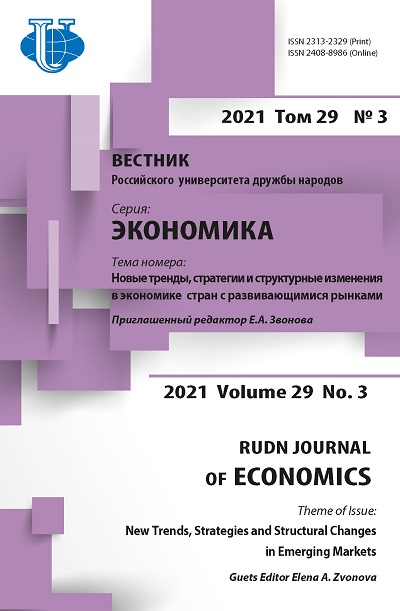Problems of customs control over the movement of hazardous waste across the customs border of the Eurasian Economic Union
- Authors: Vorotyntseva T.M.1,2
-
Affiliations:
- Peoples’ Friendship University of Russia (RUDN University)
- Russian Customs Academy
- Issue: Vol 29, No 3 (2021): New trends, strategies and structural changes in emerging markets
- Pages: 537-553
- Section: Economic integration and globalization
- URL: https://journals.rudn.ru/economics/article/view/27610
- DOI: https://doi.org/10.22363/2313-2329-2021-29-3-537-553
Cite item
Full Text
Abstract
Hazardous waste is a trigger of the environmental crisis, especially at the stage of increasing production and consumption of goods, leading to a significant increase in industrial waste and its movement across customs borders. The cross-border movement of hazardous waste is controlled by the state, customs authorities are entrusted with the tasks of protecting national security, human life and health, animal and plant life, the environment, including protection against the illegal import of hazardous waste. The transboundary movement of hazardous wastes is carried out within the framework of the permissive procedure. Such a unified licensing procedure has also been adopted in the EAEU with respect to the import into the customs territory, transit, export from the customs territory of dangerous wastes. This procedure assumes that the declarant submits to an official of the authorized body a license of the Ministry of Industry and Trade of the Russian Federation or a permit for the transboundary movement of hazardous waste of the Federal Service for Supervision of Environmental Management. However, despite the efforts of the international community in the fight against hazardous waste, the dynamics of illegal movement of certain types of waste continues to grow, which indicates the existence of a number of unresolved problems. In the course of the study, the conceptual and categorical apparatus in the field of “hazardous waste” is analyzed, the main provisions of the procedure for moving this category of goods across the customs border of the EAEU are considered. The basis for national legislation in terms of the conceptual apparatus and regulation of the transboundary movement of hazardous wastes through the customs territory of the EAEU is the norms of international law, while a comparative analysis confirms the ambiguity of their recognition and classification in the EAEU member states. The analysis of the dynamics of the movement of hazardous waste, including used pneumatic tires and tires, showed that every year the problems of environmental protection become more acute. As a result of the study, specific problems in the field of transboundary movement of hazardous wastes were identified and recommendations for their solution were given.
About the authors
Tatiana M. Vorotyntseva
Peoples’ Friendship University of Russia (RUDN University); Russian Customs Academy
Author for correspondence.
Email: mstata67@list.ru
SPIN-code: 5729-6656
Candidate of Economic Sciences, Associate Professor, Associate Professor of the Department of Customs, Peoples’ Friendship University of Russia (RUDN University); Associate Professor of the Department of Customs Operations and Customs Control, Russian Customs Academy
6 Miklukho-Maklaya St, Moscow, 117198, Russian Federation; 4 Komsomolskii Prospekt, Lyubertsy, 140015, Russian FederationReferences
- Afonin, D.N., Afonin, P.N., Paul-Marie, A.L., & Yargina, N.Yu. (2019). Customs control during the transportation of dangerous goods by international transport. Saint Petersburg. (In Russ.)
- Anisimov, V.G., Anisimov, E.G., Saurenko, T.N., & Sonkin, M.A. (2017). The model and the planning method of volume and variety assessment of innovative products in an industrial enterprise. Journal of Physics: Conference Series, 803, 012006. https://doi.org/10.1088/1742-6596/803/1/012006
- Anisimov, V.G., Anisimov, E.G., Saurenko, T.N., & Zotova, E.A. (2019). Мodels of forecasting destructive influence risks for information processes in management systems. Information and Control Systems, 5(102), 18–23. (In Russ.)
- Anisimov, V.G., Zegzhda, P.D., Suprun, A.F., & Anisimov, E.G. (2018). The problem of innovative development of information security systems in the transport sector. Automatic Control and Computer Sciences, 52(8), 1105–1110. (In Russ.)
- Bhattarai, K., & Conway, D. (2021). Impacts of economic growth, transportation, and tourism on the contemporary environment. Advances in Asian Human-Environmental Research (pp. 563–662). Springer. http://dx.doi.org/10.1007/978-3-030-50168-6_7
- Chupin, A.L., Chupina, Zh.S., Morozova, N.N., Vorotyntseva, T.M., & Levinskay, E.V. (2020). Prediction model of the efficacy and the implementation time of transportation intelligent systems. IOP Conference Series: Materials Science and Engineering, 828, 012006. http://dx.doi.org/10.1088/1757-899X/828/1/012006
- Chupin, A.L., Yurchenko, O.A., Lemesheva, Z.S., Pak, A.Y., & Khudzhatov, M.B. (2020). Development of logistical technologies in management of intellectual transport systems in the Russian Federation. Lecture Notes in Networks and Systems, 87, 778–784. (In Russ.)
- Erokhin, V., & Gao, T. (Eds.). (2019). Handbook of research on globalized agricultural trade and new challenges for food security. IGI Global.
- Gureev, P.M., Fayustov, A.A., & Prokhorova, I.S. (2021). On the issue of shadow recycling of electronic waste. Ecology and Industry of Russia, 25(4), 66–71. (In Russ.)
- Kazakova, N.A., & Kogdenko, V.G. (2021). Monitoring of the main parameters of environmental safety of industrial production. Ecology and Industry of Russia, 25(3), 60–65. (In Russ.)
- Pak, A.Yu. (2020). Foreign trade security and the system of its provision as a special element of the economic security of the state. RUDN Journal of Economics, 28(3), 597–607. (In Russ.) http://dx.doi.org/10.22363/2313-2329-2020-28-3-597-607
- Recycling of tires in Russia and the world. (2018). Solid Household Waste, (6), 34–36. (In Russ.)
- Sorokin, M.A., & Sorokin, A.М. (2019). Creating conditions for price competition with employment of risk management system in customs control of goods containing intellectual property objects. Smart Innovation, Systems and Technologies, 139, 331–339. (In Russ.)
- Sushko, V.A., Bukhtiyarova, I.N., & Zubova, O.G. (2018). Ecology as a factor in the formation of the quality of life: Methodology of sociological analysis. Ecology and Industry of Russia, 22(2), 58–63. (In Russ.)
- Timoshenko, N.A., & Egurnov, A.A. (2021). Cooperation in the field of combating cross-border crime within the framework of the Eurasian Economic Union. Bulletin of the Donetsk National University. Series: Legal Sciences, (1), 34–36. (In Russ.)
- Vorotintseva, T.M., Veselko, A.A., Sorokin, A.M., Imomnazarova, K.S., & Andreeva, E.I. (2020). Efficiency of environmental management in agriculture. In Elena G. Popkova, Bruno S. Sergi (Eds.), Scientific and Technical Revolution: Yesterday, Today and Tomorrow (pp. 1346–1353). Springer, Cham. https://doi.org/10.1007/978-3-030-47945-9_146
- Vorotyntseva, T., Levinskaya, E., Skudalova, T., Kudryavitskaya, T., & Nikulin, A. (2020). International trade and customs operations in digital era. Digital Age: Traditions, Modernity and Innovations: Proceedings of the International Conference (ICDATMI 2020), 489, 40–44. https://doi.org/10.2991/assehr.k.201212.010
- Vorotyntseva, T., Nemirova, G., & Vinichenko, A. (2020). Problems of application of digital technologies in international trade. New Silk Road: Business Cooperation and Prospective of Economic Development – 2019 (NSRBCPED 2019) (pр. 452–456). https://doi.org/10.2991/aebmr.k.200324.085
- Vorotyntseva, T.M. (2017). Analysis of export control problems. Marketing and Logistics, 2(10), 131–139. (In Russ.)
- Vorotyntseva, T.M. (2017). Problematic issues of technical regulation in the EAEU. Marketing and Logistics, 4(12), 16–26. (In Russ.)
- Vorotyntseva, T.M. (2021). On the problems of transboundary movement of hazardous waste. Customs Regulation. Customs Control, (3), 18–28. (In Russ.)
- Vorotyntseva, T.M., & Evdokimova, O.V. (2018). Problematic aspects of the movement of military products across the state border of the Russian Federation. Economic Strategies of the EAEU: Problems and Innovations: a Collection of Materials of the All-Russian Scientific and Practical Conference (Moscow, RUDN University, April 11, 2018) (pp. 39–49). Moscow: RUDN University. (In Russ.)
- Vorotyntseva, T.M., & Novikov, V.E. (2018). Problems of regulating the safety of the Russian food market. The Economy of Agriculture in Russia, (12), 17–22. (In Russ.) http://dx.doi.org/10.32651/2070-0288-2018-12-17-22
- Vorotyntseva, T.M., & Saurenko, T.N. (2018). Institutional framework of trade in goods in the EAEU. (In Russ.) RUDN Journal of Economics, 26(1), 38–46. http://dx.doi.org/10.22363/2313-2329-2018-26-1-38-46
- Vorotyntseva, T.M., Dmitrieva, O.A., Rudakova, E.V., & Morkovkin, D.E. (2019). Сurrent issues of food security in Russia. Advances in Economics, Business and Management Research: 2nd International Conference on Economy, Management and Entrepreneurship (ICOEME 2019), 85, 349–354. https://doi.org/10.2991/icoeme-19.2019.65
- Zhukova, Yu.M., Nikulina, S.N., Yakovleva, O.V., & Cherikanova, E.A. (2020). Analysis of the main trends in the development of the waste management system in Russia: Problems and prospects. Ecology and Industry of Russia, 24(8), 66–71. (In Russ.)















